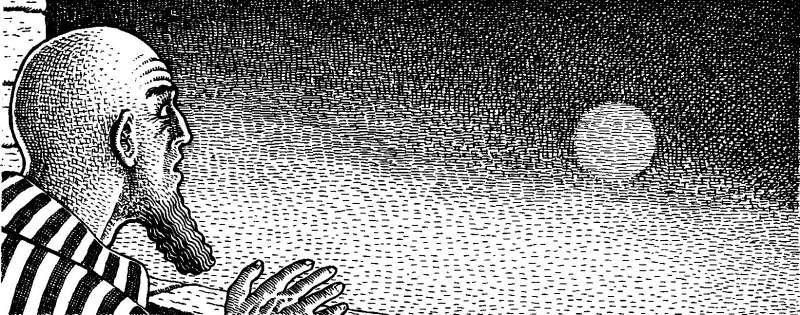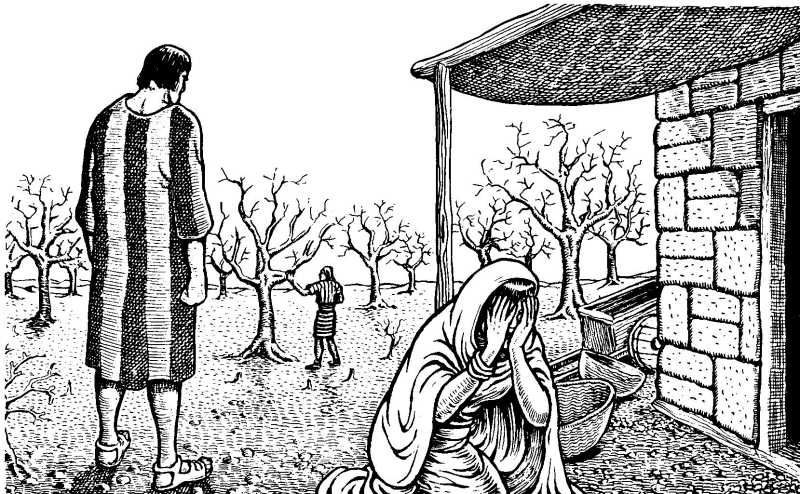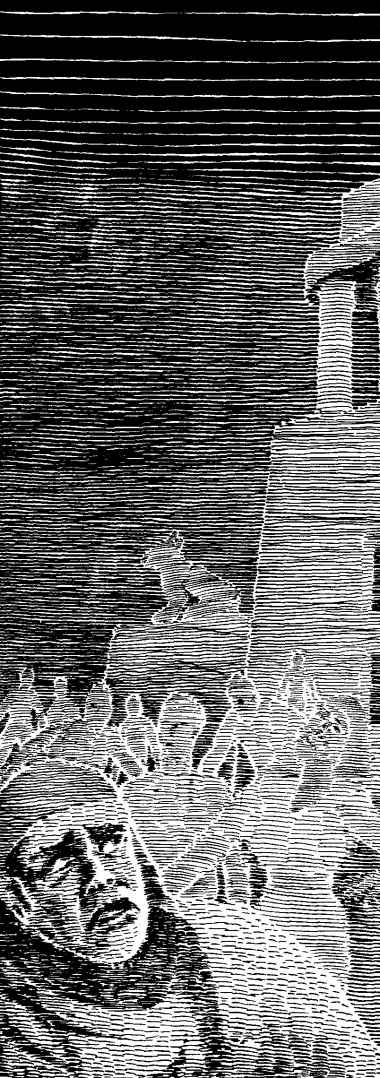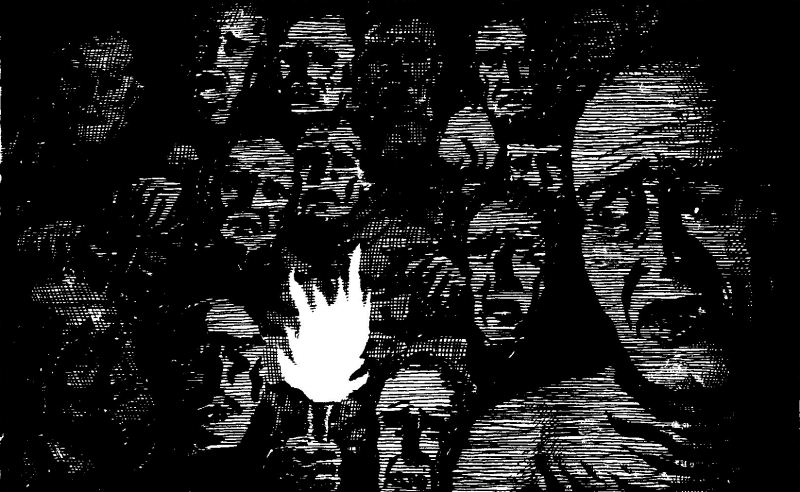NEXT morning the troubled king of Egypt arose early to observe a strangely murky sky. When he parted the curtains to get a better look, he knew that another woe had started. Huge black and red locusts were streaming by. Many of them were attaching themselves to the outside of the window and crawling inside!
Locust Plague Descends
Pharaoh backed away from the window, staring wildly as the huge insects pounced on the flower plants in a long planter box in the open side of the room. Within seconds they gnawed the plants down to the soil, then hopped, fluttered and buzzed desperately about searching for something else to devour. Suddenly the palace was in a furor. Servants and guards swatted and pounded frantically at the invaders, which by their awesomely increasing numbers were impossible to overcome. They crawled over each other in a horrid, squirming blanket several inches deep in places. They didn't bite people or animals, but it was a ghastly feeling to be crawled on and almost smothered by the sea of squirming, buzzing insects, which were well on their way to destroy the grass, trees, shrubs and plants of the country except in Goshen. (Ex. 10:15)

As Pharaoh gazed eastward, he saw the morning sun gradually disappear in a strange, dark cloud.
|
Meanwhile, advisers rushed to Pharaoh to beg him to try to put a quick end to the terrible destruction of vital growing things. They claimed he had gone too far in opposing the Israelite God, and there would soon be no worthwhile country for him to rule. Pharaoh knew they were right. Besides, he was becoming nauseated from mashing so many locusts.
"Send for the two Israelites!" he muttered sickly.

The Egyptians found that the locusts had eaten every green leaf and plant.
|
When Moses and Aaron arrived, Pharaoh again expressed his regret for acting as he had, and humbly asked them to entreat God for deliverance from this unnerving situation. (Verses 16 and 17) The two Israelites silently regarded the unhappy ruler and left, leaving him and his advisers and servants swatting at locusts in uncertain despair.
|
Shortly after Moses had asked God to stop the plague, a strong west wind came up over Egypt. It grew so intense people began to fear it would be almost as damaging as the insects. However, it did no more than blow the locusts eastward into the Red Sea, where they were drowned. (Verse 19)
After the locusts had disappeared and the wind had died down, Pharaoh went to his outer court gardens to view the damage. The shrubless sight of what had been his horticultural pride caused him such anger he decided he would hold the Israelites after all. He sent a courier to Moses with the defiant statement that the Israelites had to continue with their work. When Moses received the message, he knew the Egyptians were in for more misery.
Plague of Darkness
That same day the distressed Egyptians were puzzled to note a strange gloom filling the sky. It increased alarmingly until the darkness of night prevailed in the middle of the day. That was frightening enough, but the darkness turned to utter blackness of such a strange quality that only the strongest torches could partly penetrate it. (Verse 22) Almost all usual activity came to a stop. People stayed in their homes and beds as much as possible to avoid accidents in the intense blackness.
As time for dawn approached, there were hopes that light would come, but the depressing dark continued. There was daylight in Egypt only in the land of Goshen. (Verse 23)
Three days of these maddening conditions were three days too many, especially to Pharaoh, who had to keep surrounded by air-polluting clusters of torches to maintain his sanity. He managed to contact Moses and Aaron, whom he anxiously assured the Israelites could leave if daylight were restored. However, he forbade them to take any of their flocks of sheep and goats or herds of cattle. (Verse 24) Moses pointed out that all the animals would have to be taken because such had to be used in sacrifices to God. This angered Pharaoh. He and the Egyptians were badly in need of meat. Besides, he believed that the Israelites couldn't survive without animals to eat, and would be forced to return to slavery in Egypt.
"Unless you leave the livestock, you won't get to leave!" Pharaoh stormed. "I am weary of your demands! Get out of my palace! If I see you two here again, I'll have you killed!"
"You won't see us again!" Moses agreed. "This is the last time we'll be around to listen to you ask us to call off a plague!"
As the two Israelites departed, Pharaoh was elated to see daylight
beginning to show in the sky. The ninth plague was ending! It was a wonderful relief to have light from the sun again, but at the same time the king was miserably uneasy at the thought of any new plague that would come. He had just cut himself off from the opportunity of asking Moses and Aaron for any help from God.
|

A strange, thick gloom began to
settle over the land.
|

Even the brightest lamps and torches shone only with a weird,
ghostly feebleness in the thick, dank darkness.
|